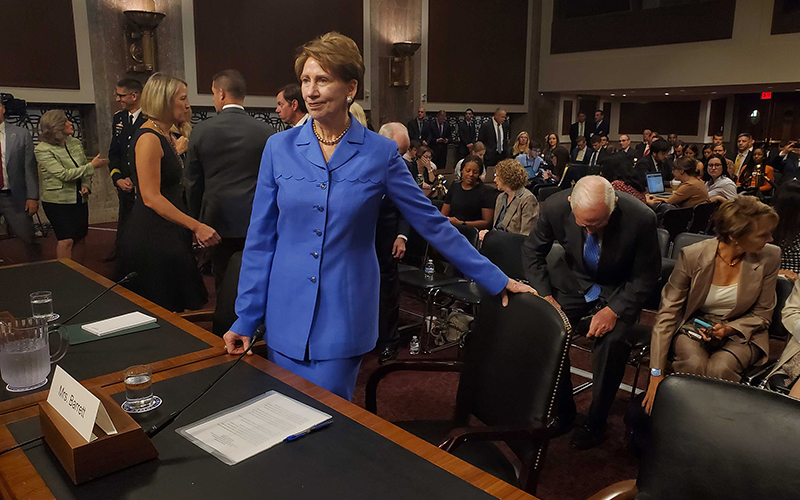
The Senate Armed Services Committee held a confirmation hearing last month for Air Force secretary nominee Barbara Barrett and Army secretary nominee Ryan McCarthy. Democrats pressed both for their opinions on President Donald Trump’s diversion of Pentagon funds for a border wall but otherwise went easy on them. (Photo by Wissam Melhem/Cronkite News)
WASHINGTON – Arizona businesswoman Barbara Barrett’s nomination to be Air Force secretary is expected to proceed without incident when the Senate returns from its two-week recess, despite concerns of one Senate Democrat who had threatened to hold it up.
Sen. Richard Blumenthal, D-Conn., was unsatisfied with Barrett’s answer when he asked if she would prohibit the use of Trump hotels by Air Force officials on business. Barrett would only say she wants “rules and regulations that are applied evenly,” but that those rules should not target a specific business.
Blumenthal later threatened to hold Barrett’s nomination on the Senate floor if she does not pledge to “implement a policy to prohibit Air Force spending at Trump-owned properties.” Despite that threat, however, experts familiar with the process say they doubt Blumenthal will be able to block a vote for long.
“She is more supremely qualified for the job than some people who have had the job in the past,” said Larry Korb, a senior fellow with the Center for American Progress who was assistant secretary of Defense from 1981 to 1985 under President Ronald Reagan.
Korb said the confirmation process can be difficult but that he did not foresee any issues with Barrett winning Senate confirmation for a role he does not see as “critical.” Korb said Blumenthal’s opposition has little to do with Barrett’s qualifications and more to do with the president.
“This is nothing against her, it’s against Trump,” he said.
Barrett served as the U.S. ambassador to Finland under President George W. Bush and was a senior adviser to the U.S. Mission to the United Nations. She also served as deputy administrator of the Federal Aviation Administration and is a member of the Council on Foreign Relations.
She was founding chairman of Valley Bank of Arizona and former board chairwoman for the Aerospace Corp., among other jobs. Barrett and her husband, former Intel chairman and CEO Craig Barrett, are benefactors of Arizona State University, whose honors college and Washington, D.C., office building are named in their honor.
After her Sept. 12 confirmation hearing, however, Blumenthal wrote to Sens. Jim Inhofe, R-Okla., and Jack Reed, D-R.I., the chairman and ranking member of the Senate Armed Services Committee. Besides complaining about the president “profiting from Department of Defense expenditures” through Air Force use of Trump hotels, Blumenthal wrote that Barrett “lacks many of the traditional credentials expected of the Secretary of the Air Force,” without specifying what those were.
His concerns did not appear to sway that Armed Services Committee, which approved Barrett’s nomination by voice vote on Sept. 18.
Blumenthal’s office said Monday that he is still pressing for an answer from Barrett and he will call for an answer when her nomination hits the Senate floor. But Senate Majority Leader Mitch McConnell, R-Ky., has already filed a cloture motion that could end debate and force a vote on her nomination as early as the middle of this month, when lawmakers return from recess.
If the cloture vote fails to pass, debate will simply continue. Even if Barrett is eventually confirmed, Blumenthal’s office said that the Connecticut Democrat vowed to use his position on the Armed Services Committee to engage in “rigorous oversight.”
Retired Army Lt. Gen. Thomas Spoehr criticized Blumenthal’s claim that Barrett lacks the qualifications for the job, saying most Air Force secretaries do not come with a great depth of military experience.
“I don’t know what kind of standard Sen. Blumenthal is using, but I don’t think it’s being applied evenly and fairly when you look at other people that have been confirmed for these positions,” said Spoehr, who serves as the director of the Center for National Defense at the Heritage Foundation.
Like Korb, Spoehr said he believes Barrett should sail through the Senate with few problems, saying that both sides of the aisle seem to view her positively.
“It won’t be unanimous, but I am certain she will get enough votes to be confirmed,” he said.


